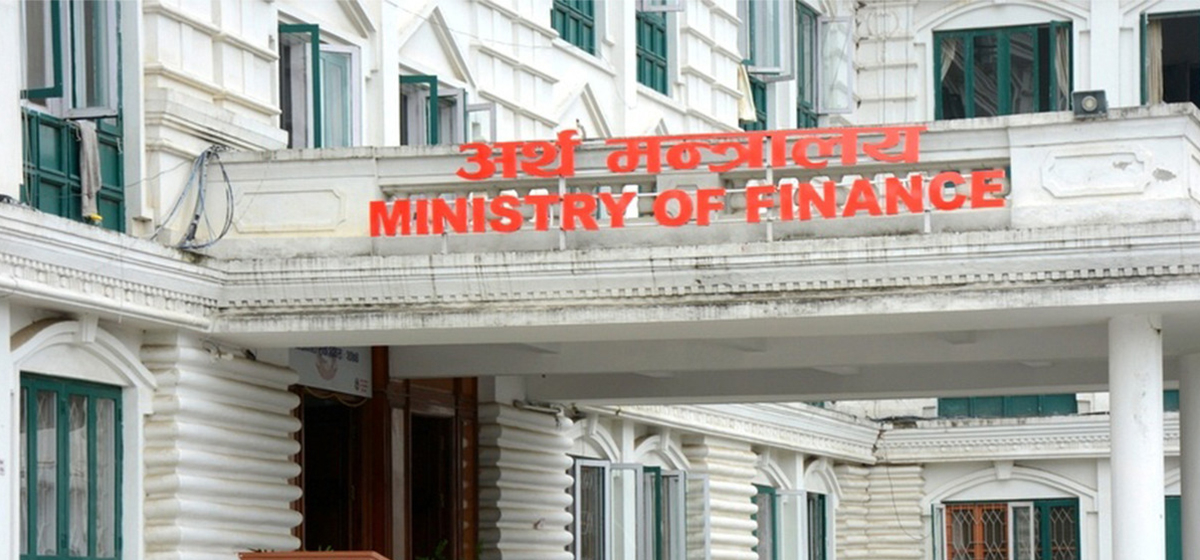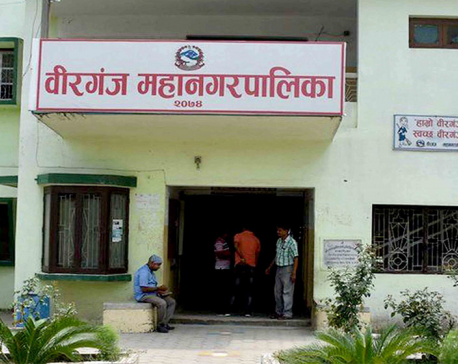
OR
Govt remains incapable of raising capital expenditure
Published On: January 15, 2024 09:45 PM NPT By: Dilip Paudel

Capital expenditure limits to 16% in six months
KATHMANDU, Jan 15: Due to procedural complications and complexities, the government is seen as incapable of spending capital expenditure. Like previous governments, this year too, the government could not increase capital expenditure.
Along with bringing the budget, the Ministry of Finance has issued 15-point measures to increase capital expenditure, but looking at the situation of six months of the current fiscal year 2080/81 BS, no progress has been made.
Like the previous government, this government is also unable to increase its spending capacity, so the condition of capital expenditure is very ineffective. According to the Finance Comptroller General Office, the capital expenditure is only 16.3 percent in the six months of the current fiscal year. This indicates the inefficiency of the government structure.
In the first six months of fiscal year 2077/78, the capital expenditure was 14.4 percent, in 2078/79 was 12.65 percent and in 2079/80 was 14.04 percent. This data shows that not only the current government but also the previous government's spending capacity is inefficient. Even the present government has not been able to increase the expenditure by correcting the weaknesses of the past.
For the current fiscal year 2080/81 BS, the government has allocated Rs 302 billon for capital expenditure, so far (in six months) only Rs 46.88 billion have been spent.
Every government has been stating that they will increase the capital expenditure, but they have been unable to increase the expenditure. On the one hand, there is minimum budget allocation for infrastructure construction.
Even the allocated budget is not spent. Due to the need to increase the budget for infrastructure construction for capital building, even the allocated budget has not been spent on time.
Former Finance Secretary Krishnahari Baskota said that the problem of not being able to spend capital due to procedural complexities has been there since the past. “Capital expenditure cannot increase until there is a change in the traditional thinking, legal and system,” said Baskota, “If the expenditure is to be increased, the current expenditure system must be changed.”
Baskota argues that there are difficulties as the donors’ assistance is the source of a major chunk of capital expenditure when the government prepares the national budget. The spending is not as expected as such assistance has to be reimbursed by the donors after the spending is made.
“The money provided by the donor also has different conditions,” he said, “There are many projects that have to be reimbursed after the completion of the work, so there has been a delay in the expenditure. The government also has a challenge in resource management in projects that are reimbursed later.”
In the case of loan assistance provided by multilateral donors like the World Bank and the Asian Development Bank, the government first spends its own money which is later reimbursed by the donors' loan assistance.
There are delays in infrastructure construction due to construction workers. “Many projects have not been completed on time due to contractors in infrastructure construction,” he said, “And this has had an impact on capital expenditure.”
Most of the infrastructure projects to be built by the government are being carried out without preparation, which creates problems. Even after allocating a large budget at one time, it has not been spent because of not completing the project concept paper, DPR, environmental impact assessment, and other processes.
According to project officials, the cumbersome process of acquiring land for the project is also an obstacle. It cannot spend the budget allocated for the project. Environmental Impact Assessment (EIA) files have been stuck in the Ministry of Forest and Environment for a long time.
Similarly, the non-availability of sand, shortage of workers, weakness in inter-agency coordination, etc. also delay the work of the project.
While the government has brought a budget of Rs 1.751 trillion, only Rs 559 billion has been spent till January 12. This is only 31.92 percent of the total expenditure. During this period, current expenditure has been 37.85 percent. Out of the allocation of Rs 1.141 trillion for current expenditure, Rs 432 billion has been spent so far.
Not only the expenditure but also the target of revenue collection is weak. In the current year, the government has set a target of Rs 1.422 trillion in revenue collection, but in six months, it has collected only Rs 468 billion in revenue. This target is 32.91 percent of the total revenue collected so far.
Former Finance Secretary Baskota said that the expenditure should be increased by changing the traditional thinking and system. “We cannot expect to increase the expenditure in the system now,” he said, “It is necessary to improve the system itself.” He said that there is a need for good relations and reforms between government agencies, facilitation of regulatory agencies, extra activism, and change in traditional thinking.
The government had announced 15 points of measures stating that there is a problem in the economy due to the lack of capital expenditure and the slowdown of infrastructure construction. The government has not been able to improve after the Office of the Auditor General, the National Planning Commission, and other agencies have pointed out the reasons for non-expenditure.
Finance Minister Prakash Sharan Mahat, during his current budget speech, said that since there were always problems in the implementation of the capital budget, he was looking for ways to solve the problem. Although it was announced in point form for the work to be done to make the capital expenditure effective, the result was not seen this year as well.
Stakeholders stated that unprepared projects are delayed due to budgeting based on specific orders and a lack of other preparations. Even mentioning 15 points to increase capital expenditure in numbers 31 to 46 of the budget statement of the current year has not solved the problem.
Inclusion of projects that can be implemented in the annual budget and program after a detailed feasibility study, land acquisition, and other preparations are completed, EIA, and other processes are completed, site clearance is ensured and the purchase plan is approved. Despite the announcement, it does not seem to be implemented.
Similarly, it was mentioned in the budget that the budget implementation action plan will be formulated and implemented by mid-July. The budget repealed the legal provision to deposit funds in the Forest Development Fund when forest areas are used for priority projects at the federal, provincial, and local levels.
It was also announced in the budget to amend the Land Acquisition Act to make the land acquisition process of the project simple and quick. The budget also talked about formulating and implementing the standards while fixing the compensation amount by the Land Revenue Office and Local Government, on top of the bank-determined property valuation while maintaining the mortgage. Although it is expected that the measures announced in the budget will improve with the increase in capital expenditure, the results have not been seen.
You May Like This

Government lowers budget numbers but claims it will meet growth target
KATHMANDU, Feb 13: The government on Wednesday expressed its firm determination to achieve its target of economic growth after revising... Read More...

Province 1 spends just four percent of development budget in 1st quarter
BIRATNAGAR, Nov 4: The capital expenditure of Province 1 in the first quarter of the current fiscal year (2076/2077) stood... Read More...

Birgunj metropolis posts growth in capital expenditure
BIRGUNJ, May 24: The Birgunj Metropolitan City has spent Rs 1.74 billion during the 10 months of the current fiscal... Read More...









Just In
- Forced Covid-19 cremations: is it too late for redemption?
- NRB to provide collateral-free loans to foreign employment seekers
- NEB to publish Grade 12 results next week
- Body handover begins; Relatives remain dissatisfied with insurance, compensation amount
- NC defers its plan to join Koshi govt
- NRB to review microfinance loan interest rate
- 134 dead in floods and landslides since onset of monsoon this year
- Mahakali Irrigation Project sees only 22 percent physical progress in 18 years









Leave A Comment